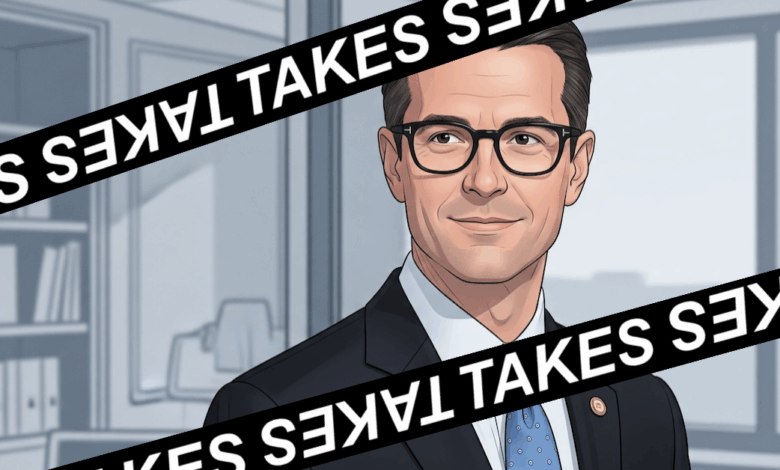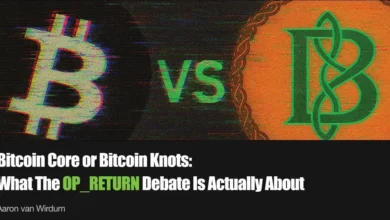Assistant Attorney General Galeotti’s Talk On Crypto Devs Changes Very Little

Today, Acting Assistant Attorney General (AAAG) of the Criminal Division of the Department of Justice (DoJ) Matthew Galeotti gave a talk at an event hosted by the American Innovation Project in which he harped on the point that the DoJ will no longer prosecute open-source crypto developers who have no intent to commit a crime.
AAAG Galeotti began his talk by telling the audience that Deputy Attorney General (DAG) Todd Blanche had asked Galeotti to speak to the audience about the DoJ’s focus on “even-handed enforcement of the law” in the digital asset space.
In AAAG Galeotti’s talk, he referenced a memo DAG Blanche issued in April, in which DAG Blanche stated that the DoJ would end its regulation by enforcement approach, popularized by the Biden administration, as it pertains to the crypto industry and crypto developers.
AAAG Galeotti reiterated and reinforced some of the points from the Blanche memo, producing a number of quotable moments in the process.
Here are some of the high notes he hit:
“The Department will not use federal criminal statutes to fashion a new regulatory regime over the digital asset industry. The department will not use indictments as a lawmaking tool. The Department cannot leave innovators guessing as to what could lead to criminal prosecution.”
“Our view is that merely writing code without ill intent is not a crime. Innovating new ways for the economy to store and transmit value and create wealth without ill intent is not a crime.”
“Generally, developers of neutral tools, with no criminal intent, should not be held responsible for someone else’s misuse of those tools. If a third-party’s misuse violates criminal law, that third-party should be prosecuted — not the well-intentioned developer.”
Prominent voices from the crypto industry posted some of these promising quotes on X:
While other prominent figures from the industry voiced their skepticism, highlighting some of the quotes from AAAG Galeotti’s speech that left cause for concern:
Having listened to the talk myself, I’d love to say I came away from it feeling optimistic, or even cautiously optimistic. (Maybe I feel a little bit of the latter.)
Mostly, though, I feel a healthy skepticism, most comparable to Van Valkenburgh’s, as it seems that AAAG Galeotti left the door open to further prosecutorial overreach by the DoJ.
Put another way, I believe the likes of the Samourai developers and Roman Storm, co-founder of Tornado Cash, would still be prosecuted in the wake of this oration, especially judging by some of the concerning comments AAAG Galeotti made in the latter half of it.
These comments included the following (non-italicized portions of quotes are included for context):
“If a developer merely contributes code to an open-source project without the specific intent to assist criminal conduct, aid or abet a particular crime, or join a criminal conspiracy, he or she is not criminally liable.”
“As the DAG memo makes clear, the Justice Department will not charge regulatory violations in cases involving digital assets, like unlicensed money transmitting under 1960(b)(1)(A) or (B), in the absence of evidence that a defendant knew of the specific legal requirements and willfully violated them. [However] we may under certain circumstances bring cases under 1960(b)(1)(C), which prohibits the transmission of funds that the defendant knows are derived from a criminal defense or are intended to be used to support unlawful activity.”
“Where the evidence shows that software is truly decentralized and solely automates peer-to-peer transactions, and where a third party does not have custody and control over user assets, new 1960(b)(1)(C) charges against a third party will not be approved. Though, if criminal intent is present, other charges may be appropriate — all of the subject’s conduct and the services they provide end-to-end will be considered.”
Having covered both the Samourai Wallet and Tornado Cash cases, I saw a lot of the “evidence” used to illustrate criminal intent for the developers in both cases.
Much of it was rhetoric related to the developers reacting to bad actors using the software they’d created in illicit activities, including instances in which they were seemingly trolling.
The most egregious instance of this being when the Samourai developers invited Russian oligarchs to use their service to evade sanctions:
Now, if I’m speaking plainly, one of the major lessons that crypto developers should have learned from the Samourai and Tornado Cash cases is don’t even joke about bad actors using your service.
With that said, it’s not illegal to joke about it, and in the case of Roman Storm, he made efforts to stop bad actors from using Tornado Cash, including implementing a Chainalysis oracle on the front end of Tornado Cash.
But I’m getting slightly off track here…
The point I’m trying to make is that AAAG Galeotti’s comments about criminal intent can be interpreted broadly, and, because of this, they eclipse many of the more positive points he made about the DoJ not aiming to prosecute crypto developers.
And so I agree with Van Valkenburgh in that we must continue to press Congress for safe harbor via the language in the Blockchain Regulatory Certainty Act (BRCA), some of the language from which has been included in the recent draft of the CLARITY Act, and fight key battles in court.
Because, even in the wake of this seemingly positive talk from AAAG Galeotti, developers are still at risk.
This article is a Take. Opinions expressed are entirely the author’s and do not necessarily reflect those of BTC Inc or Bitcoin Magazine.





